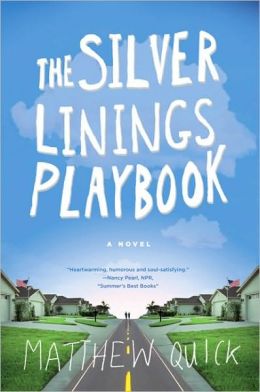 |
| “Life is random and fucked-up and arbitrary, until you find someone who can make sense of it all for you— if only temporarily.” -Matthew Quick, The Silver Linings Playbook |
I thoroughly enjoyed this book. The characters were vivid and personable. The first-person narrative from Pat is both humorous and optimistic, in what would otherwise be a rather depressing story. Pat's insights turn what could've be a downer of a story into an inspiring one. His character is very likable, as is that of Tiffany, the strange girl next door. Tiffany is very obstinate and hard-headed, but also very loving and sensitive behind her hard exterior. The characters are all very real; they have their good traits and bad. As Tiffany once says, "“There will always be a part of me that is dirty and sloppy, but I like that, just like all the other parts of myself.” No one is pure saint, and no one is pure sinner.
I also appreciated how the topic of mental illness is dealt with in this book. Recently released from a psychiatric hospital, Pat has weekly visits to a therapist, must take pills, and adopt coping mechanisms. Mental illness is not romanticized or demonized but simply shown for what it is--a disorder that some people must struggle with. Pat's illness becomes most apparent during his aggressive outbursts, which he always regrets afterwards. The book also brings attention to how some people are insensitive to mental illnesses, making jokes about them. These people don't even realize how deeply these "jokes" trouble Pat. After reading The Silver Linings Playbook, one may walk away with a deeper understanding of mental illnesses and how they can affect people.
This book does not have a Hollywood ending, but that's partly why I like it. There's no big finale where all the pieces fall in place, but the book ends with uncertainty, peace, and hope for a better tomorrow.

